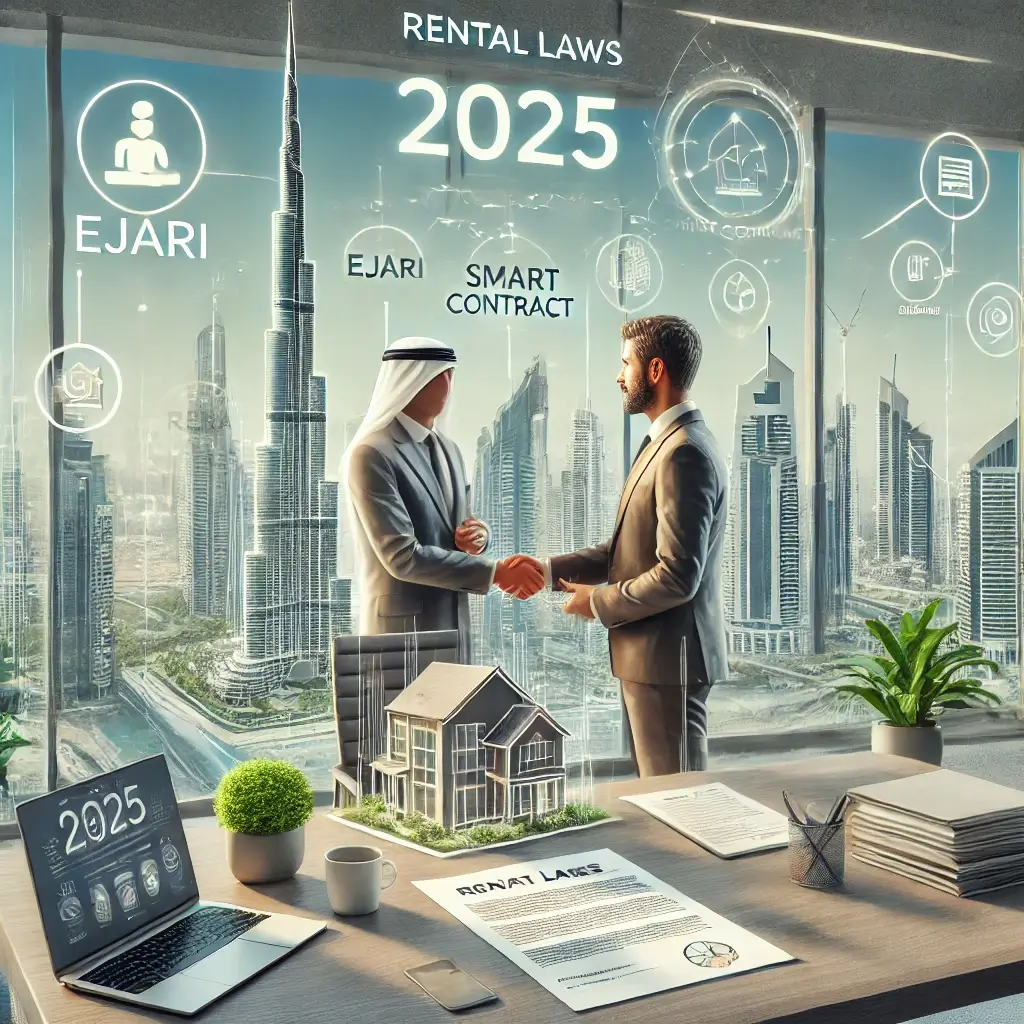Stay Updated: Dubai’s Rental Law Changes in 2025
Navigating Dubai’s Evolving Real Estate Regulations for a Fair and Profitable Partnership
Dubai’s real estate market is internationally renowned for its luxury towers, stunning waterfront villas, and favorable investor policies. As 2025 approaches, however, changes in rental regulations have made it even more important for tenants, landlords, and real estate professionals to stay updated. Whether you’re leasing your first apartment, managing a portfolio of properties, or working as a real estate agent, understanding these new rental laws is crucial for ensuring compliance, avoiding disputes, and optimizing rental partnerships.
This detailed guide will walk you through the key rental laws and updates for 2025, offering actionable insights that will help you stay ahead of the curve in Dubai’s dynamic property market.
1. Understanding the Legal Framework: RERA and Ejari
Why It Matters:
Dubai’s rental market is regulated by the Real Estate Regulatory Agency (RERA), ensuring fairness and transparency for both tenants and landlords. A key part of this regulatory framework is the Ejari system, which serves as a mandatory online registration platform for all lease agreements in Dubai.
Key Points for 2025:
- Ejari Registration: In 2025, all rental contracts must be registered via the Ejari system for them to be legally enforceable. This process ensures that both parties are protected in case of a dispute, and any unregistered contract will not be recognized by the courts.
- Standardized Contracts: RERA has introduced standardized templates for rental contracts, ensuring clarity and consistency across all agreements. These templates help establish clear terms for rent, maintenance responsibilities, contract renewals, and more.
2. Rent Increase Caps and Indexation
For Tenants:
- 2025 Rent Cap Update: Although Dubai abolished fixed rent caps in 2023, the RERA Rental Index continues to guide permissible rent increases. Landlords are only permitted to raise rents if the current rent is 20% below the average market rate for similar properties in the area.
- Notice Period: Landlords are required to give 90 days’ written notice before increasing the rent or terminating the rental contract. This ensures that tenants are well-informed and have adequate time to make adjustments or find alternative accommodations.
For Landlords:
- RERA Rental Calculator: Landlords can use the RERA Rental Calculator to ensure any rent increases are justified based on the current market conditions and the Rental Index. This helps avoid disputes with tenants and ensures fair pricing.
3. Eviction Rules: Valid Reasons and Notice Periods
Landlords Can Evict Tenants ONLY If:
- They intend to sell the property or move in themselves, which requires 12 months’ notice via Notary Public.
- They need the property for major renovations, which must be approved by the Dubai Municipality.
- The tenant violates the terms of the contract (e.g., by subletting without permission or failing to pay rent for 30+ days).
Tenant Protections:
- Tenant Rights: Tenants have strong protections and can contest wrongful evictions through the Rental Dispute Center (RDC), ensuring that they are not unfairly displaced.
4. Security Deposits and Maintenance Responsibilities
Security Deposit Rules:
- Maximum Amount: Landlords can request a security deposit of up to 5% of the annual rent for unfurnished properties and 10% for furnished properties. This deposit ensures that the tenant meets their obligations under the lease agreement.
- Refund Timeline: The security deposit must be refunded within 14 days after the lease expires, minus any deductions for damages (which should be properly documented with photos or written reports).
Maintenance Responsibilities:
- Landlord Obligations: Landlords are responsible for major repairs related to the property’s structure, including plumbing, electrical systems, and air conditioning.
- Tenant Responsibilities: Tenants are responsible for minor repairs and upkeep, such as changing light bulbs or repairing minor paint damage, unless otherwise specified in the rental agreement.
5. New for 2025: Digital Transformation and Sustainability
Digital Compliance:
- Paperless Transactions: The digitization of rental processes has been accelerated, and now Ejari renewals, dispute filings, and contract amendments can be processed entirely online via the Dubai REST app. This allows for faster, more efficient interactions and reduces the risk of errors in paperwork.
- Smart Contracts: Blockchain-based lease agreements are becoming increasingly popular in 2025 due to their transparency, security, and ease of execution.
Sustainability Laws:
- Green Clauses: New rental contracts may include clauses that enforce energy and water usage benchmarks in line with Dubai’s 2040 Urban Master Plan. These clauses aim to support the city’s sustainability goals and may appeal to environmentally-conscious tenants and investors.
6. Resolving Disputes: The Rental Dispute Center (RDC)
Steps for Tenants/Landlords:
- Filing a Case: Both parties can file a dispute online via the RDC portal (available in both Arabic and English).
- Filing Fee: The filing fee is 3.5% of the annual rent, capped at AED 20,000.
- Mediation and Court: After the initial filing, a mediation session will take place. If unresolved, the case will proceed to court for a final ruling.
7. Penalties for Non-Compliance
Failure to comply with Dubai’s rental laws can result in significant penalties:
- Late Rent Payments: Tenants will incur a 5% monthly penalty after 30 days of non-payment.
- Unlicensed Agents: Real estate agents operating without a valid RERA license face fines of up to AED 100,000.
- Illegal Subletting: Tenants risk eviction and blacklisting for subletting the property without permission.
Conclusion: Staying Ahead in Dubai’s Rental Market
The 2025 rental laws in Dubai reflect a broader emphasis on fairness, digitalization, and sustainability. For tenants, understanding their rights is key to avoiding exploitation and ensuring a positive rental experience. Landlords, meanwhile, must stay compliant to safeguard their investments and avoid costly legal disputes.
Real estate professionals should prioritize educating clients on the Ejari system, RERA’s Rental Calculator, dispute resolution processes, and the increasing focus on sustainability in rental contracts. Building trust in a competitive market is essential, and those who embrace these changes will stand out as trusted experts in the industry.
Need Help? Always consult RERA-certified agencies or use the Dubai Land Department (DLD) portal for verified resources to ensure compliance with all local regulations.
FAQs:
- What are the new Ejari registration requirements for Dubai rental contracts in 2025?
All rental agreements must be registered via the Ejari system to be legally enforceable. Unregistered contracts risk being invalid in disputes. RERA’s standardized templates ensure clarity on rent, maintenance, and renewals. - How does Dubai’s 2025 rent cap policy work for tenants and landlords?
While fixed rent caps were abolished in 2023, landlords can only increase rent if the current rate is 20% below the RERA Rental Index’s average. Use the RERA Rental Calculator to verify permissible increases. - What are valid reasons for evicting a tenant under Dubai’s 2025 rental laws?
Landlords may evict tenants only for selling, personal use (with 12 months’ notice), major renovations, or lease violations (e.g., unpaid rent for 30+ days). Tenants can contest wrongful evictions via the Rental Dispute Center (RDC). - How much security deposit can a landlord charge in Dubai in 2025?
Landlords can request up to 5% of annual rent for unfurnished properties and 10% for furnished. Deposits must be refunded within 14 days post-lease, minus documented damages. - What penalties apply for late rent payments in Dubai?
Tenants face a 5% monthly penalty after 30 days of non-payment. Repeated delays may lead to eviction or blacklisting. - Are digital rental contracts legally binding in Dubai in 2025?
Yes! Blockchain-based smart contracts and paperless transactions via the Dubai REST app are legally recognized, streamlining renewals and amendments. - How can tenants dispute unfair rent increases or evictions in Dubai?
File a case through the RDC portal (Arabic/English) with a 3.5% fee (capped at AED 20,000). Mediation precedes court rulings if unresolved. - What sustainability clauses are included in Dubai’s 2025 rental agreements?
New “green clauses” align with Dubai’s 2040 Urban Master Plan, mandating energy/water efficiency benchmarks to promote eco-friendly practices. - Can landlords increase rent without tenant consent in Dubai?
Rent hikes require 90 days’ written notice and must align with the RERA Rental Index. Tenants can challenge unjustified increases via RDC. - How does the RERA Rental Calculator ensure fair pricing in 2025?
The tool cross-references property specifics with the Rental Index to determine permissible increases, minimizing disputes and ensuring market-aligned rents.




Join The Discussion